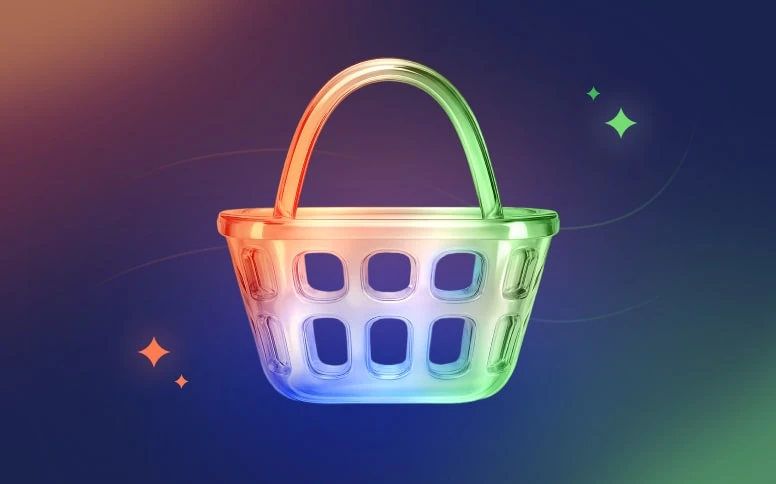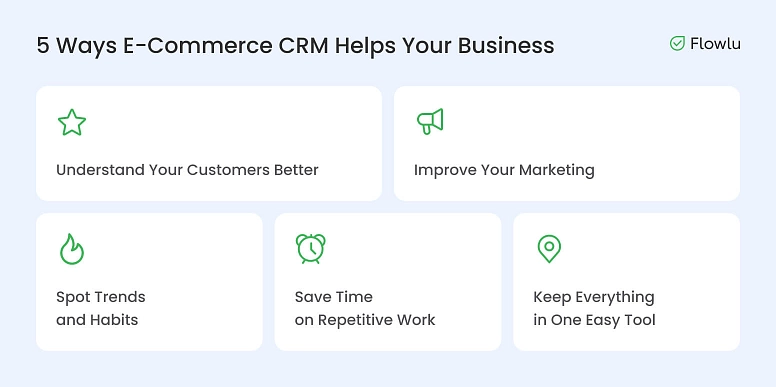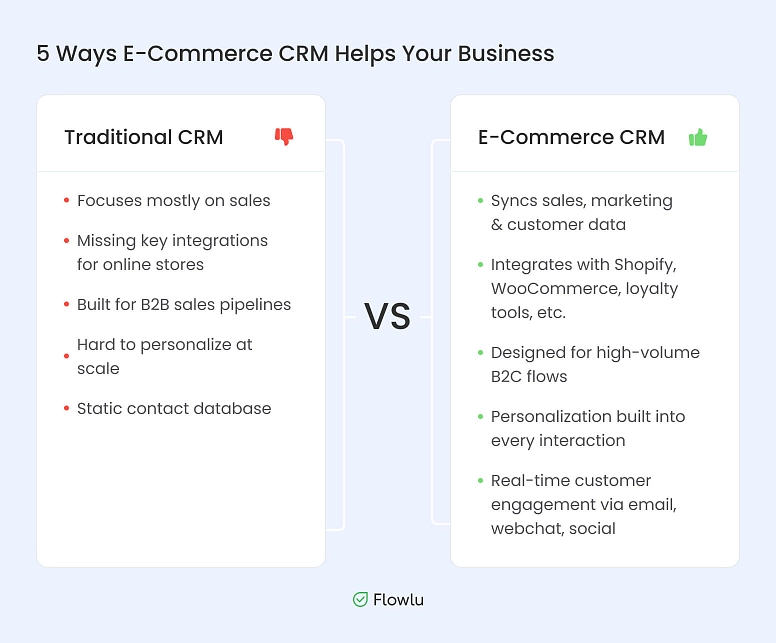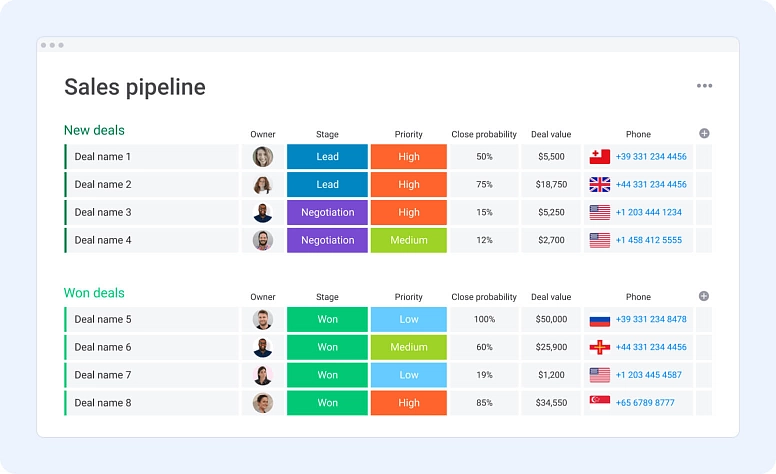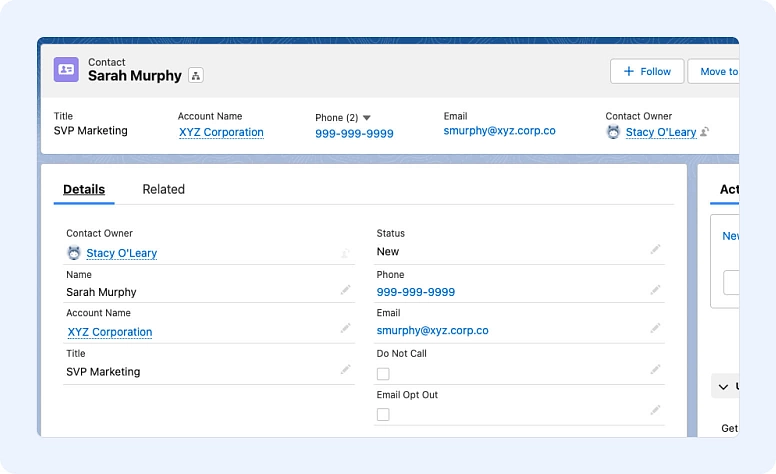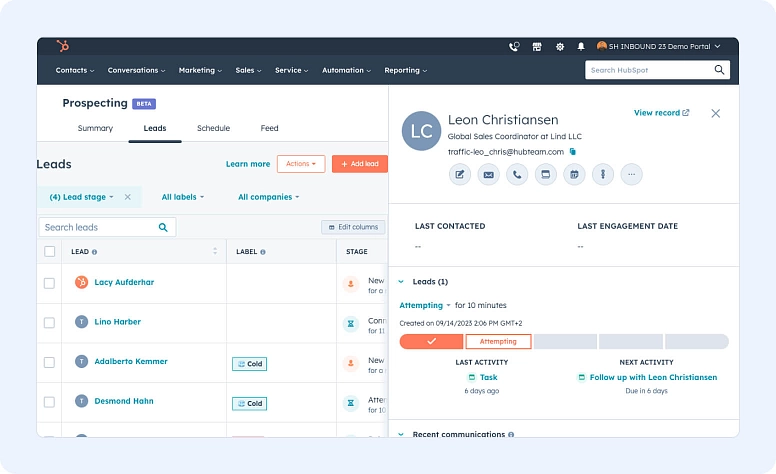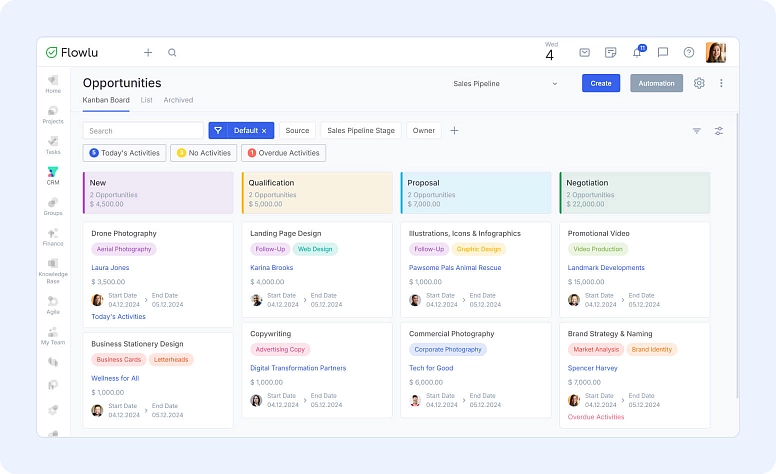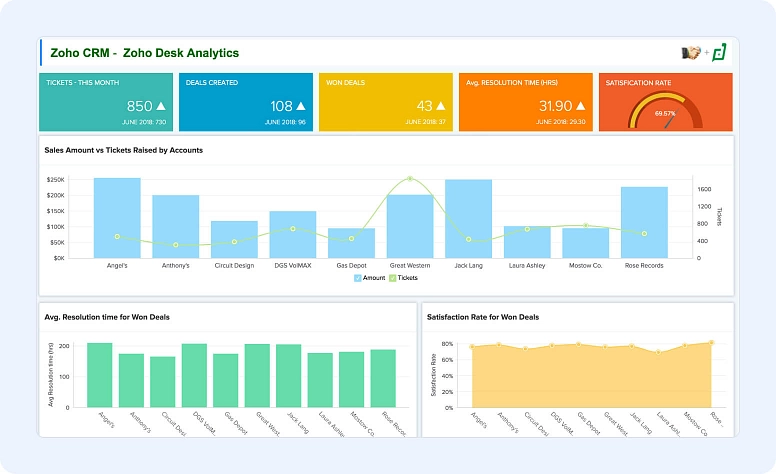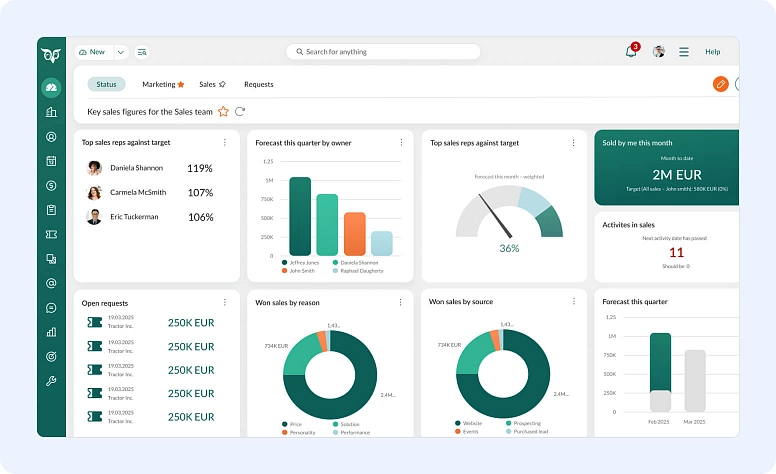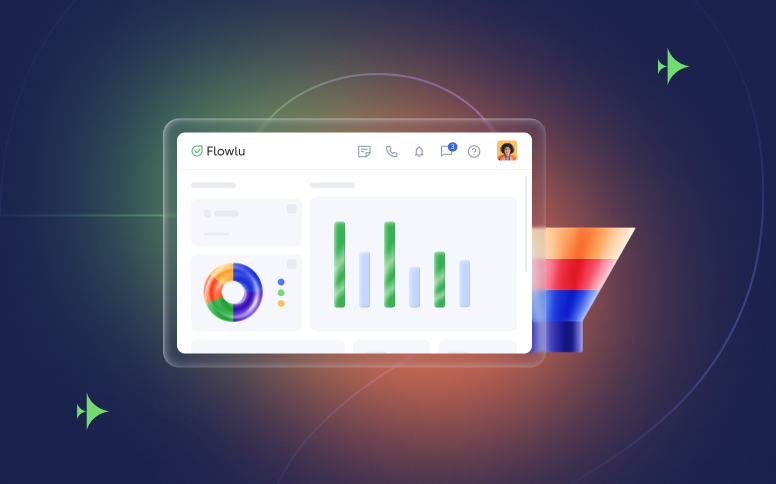What Is an E-Commerce CRM? A Quick Breakdown
When you have an online store, you know that you are opening the doors of your business to the entire world. And this is incredibly exciting, but it can be a bit overwhelming at the same time.
After all, you want to ensure that you keep your customers’ data (demographics, activities, and more) safe and secure. But it should also be in a place where you can easily access it to ensure that you can know more about your customers, serve them better, support your sales process, and, ultimately, increase online sales.
This all means that you need to have a bulletproof system that can help you with your business activities—a CRM for online stores.
What Is an E-Commerce CRM Software?
Simply put, an e-commerce customer relationship management (CRM) system is a software that can help e-commerce businesses with their interactions with customers. Among its main functions, a CRM for e-commerce companies can help you improve customer support service, manage your sales processes, and even track customer interactions across different sales and customer channels.
One of the most practical parts? All your client data stays in one place. You can find what you need, when you need it, without digging around.
An e-commerce CRM helps you see what’s actually going on in your business. It makes it easier to catch customer issues early and spot areas where sales could pick up.
5 Benefits of E-CRM Software
There’s no question that using a CRM for an e-commerce website brings a lot of benefits. Here are some of the most important ones:
#1: Get More Knowledge Over Your Customers:
Running an online store involves paying close attention to your customers. An e-commerce CRM brings all their details together, so you can arrange, review, and act on the information in a way that suits how you work. It also lets you craft messages that speak to individual preferences—and encourage repeat visits without sounding generic.
#2: Create Better Marketing Campaigns:
With an e-commerce CRM strategy defined for marketing purposes, you can certainly expect to achieve better results. After all, you’ll be able to target customers based on their preferences, behaviours, sales history, and others.
#3: Determine Trends & Patterns:
With a CRM system in place, patterns start to surface—what’s working, what’s slipping, and where interest is building. Instead of guessing, you’re working with clear signals customer behavior and sales activity, making choices that move your business forward with less trial and error.
#4: Cut Repetitive Tasks (And the Time Spent):
All companies incur repetitive tasks. However, when you’re using e-commerce CRM solutions, you can save a lot of time automating some of these tasks. The time you save on these can then be used on more lucrative sales efforts or with the potential of making your customer relationships stronger and your business grow.
#5: Run Your Business With a Simple Tool:
Running a business means that you need to use many different tools all the time. However, a CRM system like Flowlu can combine all the tools you need in just one place, making your job a lot easier. And even if Flowlu doesn’t include a specific tool you usually use, it comes with plenty of integrations for sales, customer, and collaboration workflows.
Why an E-Commerce CRM Is Better Than a Traditional CRM for Online Stores
No matter if you use Shopify, WooCommerce, or other e-commerce platforms, the truth is that using an e-commerce CRM integration is key. However, you probably link CRM systems with B2B companies and not with B2C companies. The reality, as you are well aware of, is that you need to manage your relationship with your customers closely. But if you opt for a traditional CRM system, you’ll notice:
#1: Data Silos:
Most CRM systems tend to focus mainly on sales. However, this means that your commerce, customer, and marketing teams will be missing important insights that can help grow your organization. This doesn’t help online store owners in any way since it doesn’t allow them to actually know more about what their customers expect and are looking for.
#2: Specific Integrations:
A good CRM system allows multiple integrations to help business owners better manage and run their companies. However, you may lack specific integrations for online stores within a traditional CRM.
For example, it might be difficult to find one that allows you to include tools such as subscription management systems, loyalty programs, e-commerce platforms, review platforms, website analytics, sales tools, among others. That’s where CRM solutions like Flowlu come in, offering built-in tools and integrations that are especially useful for e-commerce teams (both small and large!).
#3: Flexibility:
The truth is that most CRMs were designed for B2B companies. However, B2B and B2C companies are very different. One of the main differences is that B2C companies deal with a lot more customers and smaller amounts. The flexibility degree that you get in a CRM system like Flowlu is exactly what online stores need—for customer relationships and high-volume sales activity.
#4: Personalization:
One of the main benefits of using a CRM and e-commerce integration is that you can personalize everything you want and tailor customer experiences at scale.
#5: Customer’s Interaction:
While a traditional CRM only allows you to add data or clean it, the best CRM e-commerce allows you to interact with your customers in multiple ways. You may use social media, your website, SMS, email, and in-store.
There’s no question that CRM and e-commerce are tightly linked. With the insights that you get from the e-commerce CRM, you may then feature a category that is selling more and put it on your home page, for example. You may also use the e-commerce CRM to get new leads for your company using a chat on your website. This turns customer interest into sales more effectively.
6 Features the Best CRM For E-Commerce Includes
When you’re looking for the best CRM software for e-commerce, you want to make sure that it comes with some specific features, including:
#1: Deal Management:
Managing and keeping track of all the deals that you make using visualization is a great feature that you should look for in a CRM for e-commerce. Make sure that it also allows you to customize the different stages according to your sales process so that you can boost your closure rates and streamline customer workflows at the same time.
#2: Account & Contact Management:
It’s important to have a clear, up-to-date record of every customer. You’ll want to do more than just look things up—you should be able to adjust contact details, revisit past purchases, and review conversations without hassle.This will be a great help for your teams to know exactly who they are talking to all the time.
#3: Lead Management:
All online businesses need to get new leads. But it’s also important to nurture them, and this is something an e-commerce CRM system can help you with. After all, you’ll be able to qualify each lead accurately, so it will be easier to convert it into a customer and build long-term customer relationships.
#4: Sales Operations:
With an e-commerce CRM system like Flowlu on your side, it will be easy to streamline your sales activities to get consistent results and make sure that all operations go smoothly.
#5: Sales Analytics:
It’s very important to get good insights about your sales—determining the strategies that are working and the ones that aren’t, how to optimize your sales process, and where you can improve customer targeting and engagement.
#6: Sales Forecasting:
Using past data is crucial to forecast future sales. This can be a huge help to do better resource allocation and planning while anticipating customer demand trends more accurately.
How to Choose the Best E-Commerce CRM for You
With so many e-commerce CRM systems to choose from, you want to ensure that you pick the right one for your company. So, just ask yourself the following questions:
#1: Will it scale with my business?
Scalability is directly linked to automation. Even though your business may still be a small business, your goal is to grow it. So, when you’re looking for a CRM system, make sure that you look for automation features. While you might be doing a lot of repetitive tasks manually right now, as your company grows, it will be impossible to remain that way. So, make sure that the CRM that you choose grows with your business.
#2: Is it very technical?
Some CRMs are built for technical users; others are easier to navigate. Unless you’ve got a developer on standby, it’s worth choosing one that’s straightforward—like Flowlu, which lets you get set up without a learning curve. With this CRM, you can easily customize the platform and organize all items as you like. You’ll also like the experience of getting the reporting about your activities.
#3: Does it offer e-commerce-specific features?
Since you are running an online store, this is a crucial question that you need to ask. As you can easily understand, some traditional CRMs may lack specific tools for e-commerce stores.
So, it’s worth checking that the CRM you choose supports features like product recommendations, browse abandonment prompts, cart recovery flows, and post-purchase follow-ups. It should also connect seamlessly with your e-commerce platform—no workarounds needed.
#4: Can it handle B2C data volume and speed?
As we already said above, B2C companies deal with many orders of lower value, compared with B2B companies. Therefore, you need to make sure that the CRM system that you choose can consistently process all these transactions and interactions in real time. You just can’t afford to lose money if the system goes down, even if it is for a couple of hours.
#5: How does it handle personalization?
Personalization is critical for every business. When choosing the best e-commerce CRM for your company, you need to make sure that you can get a complete view of your customer data and browse it if you need. You’ll also want to make sure that you can organize it according to your own parameters. This means that the e-commerce CRM that you pick should allow automations, build detailed reports, and segment data.
Bottom Line
A CRM for e-commerce is a very important tool to help you not only manage but also grow your business. It should grow as your business grows, which means that you need to choose one that is scalable and flexible like Flowlu.
Make sure that you check the different features that it includes and that your team will be able to start using it right away.
A CRM, or Customer Relationship Management system, is a software that helps businesses of all industries and of all sizes gather information regarding their customers, keep track of their progress across the sales funnel, and manage marketing campaigns and sales.
If you’re running an online store, yes, you need a CRM for e-commerce like Flowlu. It’s not a must-have, but it still can make a noticeable difference. It can help you sell more, keep customers happier, and run things more smoothly.
What works best depends on how your business runs. Still, Flowlu’s worth a look. It handles a wide range of setups and does not force you to bend to its rules.





